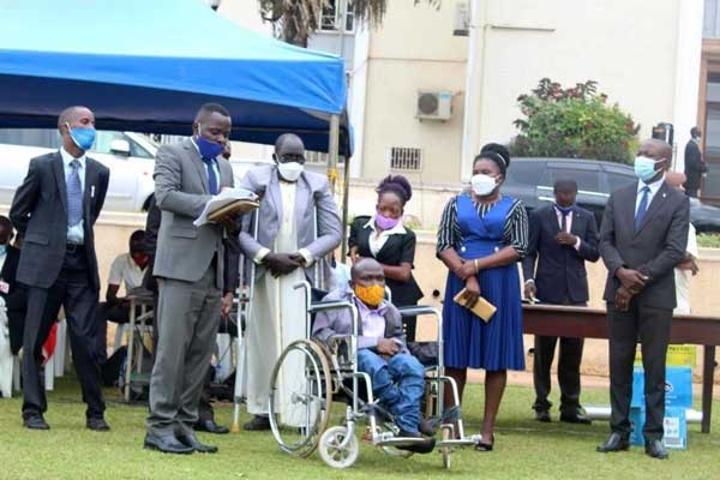Africa-Press – Uganda. Medical workers in Rakai District are worried following the rising prevalence of Tuberculosis (TB).
Mr Robert Musinguzi, the Rakai District TB focal person, at the weekend said they register an average of 2,000 TB cases every month.
“We try as much as we can to sensitise the residents about the disease but we have few staff. If district leaders can join us [in sensitisation] then we can expect some change,” he said during an interview at the weekend.
Mr Musinguzi said most cases have been registered in Lwamaggwa, Kibanda, Kiziba, Ddwaniro and Byakabanda sub-counties.TB is a bacterial infection that attacks the lungs; acquired through droplets from the coughs or sneezes of an infected person. The disease is ranked among the 10 top causes of death globally.
He said the typical symptoms of TB include chronic cough with sputum containing blood, fever, night sweats and drastic weight loss.He revealed that Rakai General Hospital only treats TB at its early stages and that they need a special unit to enable isolation of patients.
“We need a unit where we can isolate these patients to limit the spread of the disease. If the positive cases are not isolated, there will be a wide spread,” he added.
Mr Musinguzi further revealed that Lwamaggwa Sub-county has the most dangerous type of TB and that cases registered from the area are referred to either Masaka or Mbarara regional referral hospitals.
The high TB prevalence recently prompted the district council to pass an ordinance compelling local leaders and residents to prioritise issues of People With Disabilities (PWD’s) and persons living with HIV/Aids.
The TB Prevention and Treatment Ordinance, according to the framers, is aimed at involving all people regardless of their physical appearance, age, state of health and other related living conditions in the fight against TB.
However, medics in the area attribute the rising TB cases to poor hygiene among residents.
Mr Richard Musisi, the executive director of Masaka Association of Disabled Persons Living with HIV/Aids (MADPHA), which pushed for the ordinance, said residents have for a very long period been vulnerable to getting infected with HIV/Aids and TB.
“We introduced this [ordinance] in Masaka and Rakai districts as model districts. Since Rakai was the first district to be hit by the HIV/Aids, we had to consider it first,” he said.MADFA is a non-governmental organisation that aims at uplifting living standards of PWDs.
“Following the passing of this ordinance, all people shall receive equal treatment and care for TB regardless of their physical appearance. We expect local leaders to monitor all health units and public places to ensure they have ramps so that PWDs can easily access TB treatment,” he added.
Mr Charles Ssegirinya, the Rakai District speaker, also a PWD, said if the ordinance is fully enforced it will make it easier for PWDs to access services at health centres.
“With this ordinance, we hope to reduce TB infections by at least by 50 per cent by the end of this year,” he said.
Health reports indicate that patients at the early stage are exposed to pulmonary TB which attacks people whose immunity has weakened. These include children, the elderly and HIV /Aids patients.
Dr Moses Sakur, the Rakai District Health Officer, appealed to the government to roll out a national systematic TB screening model where if one tests positive for TB, all people who have come into contact with him/her are screened too.
“I am sure if such a programme is rolled out we will go along way in fighting TB. We also need more stakeholders and tactics of engaging the community on TB prevention,” Mr Sakur said on Monday.
Rakai is one of the traditional hard- to -reach districts that have been hit by chronic diseases, hence prompting the Ministry of Health to deploy more health workers aspatients also find it difficult to move to the health centres.
In the early 1980s, the area was hit by HIV/AIDs.






